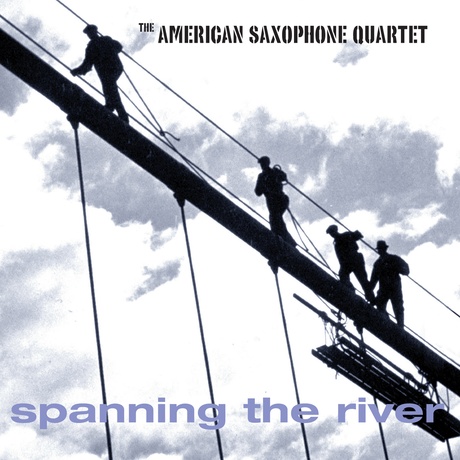
Source
Spanning The River
American Saxophone Quartet

Source
SPANNING THE RIVER, for the ASQ, means using the remarkably versatile saxophone to cross the waters of time, place, and musical genre, building bridges between Baroque and contemporary works, American and international composers, and both classical and jazz forms.
Sonatas for Saxophone Quartet
by Domenico Scarlatti
(arr. Jacques Larocque)
01 Presto (1:59)
02 Andante e Cantabile (4:16)
03 Allegro (1:43)
Quartet for Saxophones
by David Matthews
04 Allegro (9:08)
05 Slow - Quasi Cadenza (6:46)
06 Perpetuo Moto Interotto (4:47)
Histoire du Tango
by Astor Piazzolla
07 Bordel 1900 (4:40)
08 Café 1930 (7:14)
09 Night Club 1960 (6:05)
10 Concert d'Aujourd'Hui (3:16)
Quartet No. 1 in Three Movements
by Bob Mintzer
11 Allegretto (3:14)
12 Slowly (4:06)
13 Allegro (3:41)
AMERICAN SAXOPHONE QUARTET,
Albert REGNI, soprano saxophone
David DEMPSEY, alto saxophone
David CARROLL, tenor saxophone
Lino GOMEZ, baritone saxophone
DOMENICO SCARLATTI (1685-1757), the greatest Italian composer for harpsichord of his time, wrote over six hundred sonatas. The three presented here display the startling suitability of the saxophone quartet for the music of the Baroque era. The virtuostic figuration characteristic of his harpsichord writing translates perfectly for saxophone, and the contrasting lyrical sonata lends itself beautifully to saxophone bel canto.
DAVID MATTHEWS (b. 1942) is a veteran of the jazz and commercial recording scene, composing and arranging for such luminaries as James Brown, Bonnie Raitt, Paul Simon, and Buddy Rich. His Manhattan Jazz Quintet is one of the leading jazz groups in Japan. Here in its premiere recording, Matthews' "Quartet For Saxophones" features solo and section-style writing that pushes each horn to its technical limits in terms of range, dynamics, and velocity.
ASTOR PIAZZOLLA (1921-1992) dedicated his professional life to the tango music of Argentina, his native country. The movements of "Histoire du Tang"o reflect the ever-changing role of this musical form in an evolving society. The work was composed for flute and guitar, and this arrangement for saxophone brings to fruition a project which Piazzolla had launched but was unable to complete in his lifetime.
BOB MINTZER (b. 1953) is an acclaimed composer, saxophonist, improviser, arranger, and bandleader. A charter member of the ASQ, he is best known as a member of the jazz group Yellowjackets. His "Quartet No. 1 In Three Movements," in its premiere recording here, seeks to relate such English pastoral composers as Percy Grainger and Ralph Vaughan Williams to the more acerbic styles of Stravinsky and Copland, and to overlay the whole with the ostinato and over-the-bar rhythms of jazz. The composer says, "I tried to work in such a way that the lower saxes provide lush harmonies against which the soprano sax has an opportunity to shine and be expressive."
"…The four performers who make up this quartet are excellent individually and also work together very nicely, producing a pleasing sound and a tight ensemble… saxophone fans will find a lot to like here, especially the first-rate musicianship and the interesting repertoire."
- Fanfare, September/October 1999
"…[This disc] offer examples of both transcriptions and original compositions that explore the expressive and technical potential of the saxophone… Playing, tone production, and sonics on [the disc] are outstanding. Ensemble is precise, and there is also the admirable sense of give and take that one finds in the finest string quartets… there is much that the avid student and teacher of the saxophone can learn from these new items."
- American Record Guide, September/October 1999